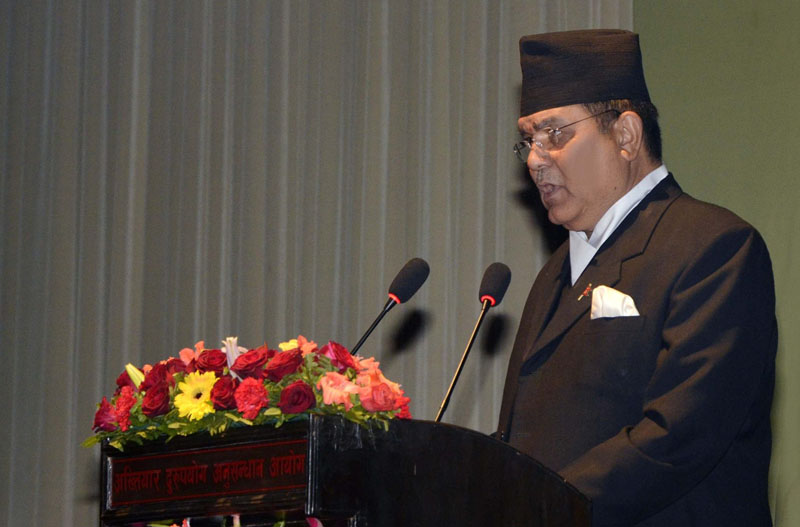Karki fit for CIAA chief’s job, argue his lawyers
Kathmandu, January 5
Lawyers representing suspended chief of the Commission for the Investigation of Abuse of Authority Lokman Singh Karki in a case challenging his eligibility for the job argued that his appointment was in conformity with legal provisions.
Karki’s lawyers argued before a full bench that Karki could not be disqualified for the job just because his name figured in the Raymajhi Commission’s report as it was not tested in a court of law. A full bench of justices Ishwar Prasad Khatiwada, Ananda Mohan Bhattarai and Anil Kumar Sinha is hearing five cases filed against Karki.
Senior Advocate Mahadev Prasad Yadav argued that since the chief justice is a member of Constitutional Council and since the office bearers of the CIAA are nominated by the CC, the chief justice should not hear such a case. He also said that the bench of chief justice should not have given permission to review the case against Karki.
Cases filed against punitive actions of Judicial Council are not heard by the bench of the chief justice and the seniormost justice of the SC and the court should have applied the same norms in this case, Yadav argued.
On the question of Karki’s eligibility for the job of CIAA chief, Yadav said the SC should not test Karki’s eligibility as he was appointed CIAA chief on the basis of Constitutional Council’s nomination.
Yadav cited the precedent of former justice Ram Nagina Singh, saying he was appointed a member of the National Human Rights Commission on the recommendation of the Constitutional Council, but the SC refused to test his eligibility on grounds that the decision to appoint him as NHRC member was made by the Constitutional Council.
Former vice-president of Nepal Bar Association Surendra Kumar Mahto said the decision taken by Karki during the 2006 popular movement was merely an execution of the decision of higher authority and since it was a political decision it could not be interpreted as an issue of high moral character.
He said Karki became the chief secretary — the top post in the bureaucracy — because he was a distinguished person. Mahto also argued that Karki never faced any punitive action by the government during his career and the punitive action recommended by a political committee under CPN-UML Chair KP Sharma Oli after the 2006 popular movement was just a political mechanism with no legal authority.
He rejected the writ petitioner’s claim that Karki lacked 20 years of experience required for the job, saying if training period could not be counted in a bureaucrat’s tenure then the same argument could be extended to discount the period of holidays.
Mahto said high moral character could not be a question in the case as the SC’s order to revive the case had not stated it as a legal question.
Former Attorney General Baburam Kunwar said the SC gave its permission to review the verdict of the division bench’s verdict on the ground that the division bench ignored two precedents of the apex court but the division bench had not ignored those precedents and had rather endorsed them.
Senior Advocate Sushil Kumar Panta also defended Karki. Two senior advocates Badri Bahadur Karki and Krishna Prasad Sapkota would also argue on Karki’s behalf tomorrow.
The next hearing of the cases has been scheduled for tomorrow. Petitioner’s lawyers would rebut the arguments made by Karki’s lawyers.






